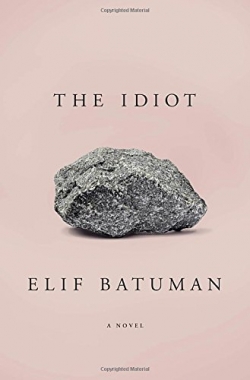The Idiot
by Elif Batuman
reviewed by Brooks Sterritt
In the Spring 2006 issue of n+1, Elif Batuman makes the case for what the novel should do. Reading the Best American Short Stories anthologies of 2004 and 2005, she writes that, almost without exception, the stories have been “pared down to a nearly unreadable core of brisk verbs and vivid nouns” that is “celebrated as ‘lean,’ ‘tight,’ ‘well-honed’ prose.” The novel, on the other hand, “consists of all the irrelevant garbage, the effort to redeem that garbage, to integrate it into Life Itself, to redraw the boundaries of Life Itself.” In 2017, with the publication of The Idiot, Batuman gives us a version of this novel.
The Idiot incorporates a boundary-redrawing method of communication—email, that purveyor of garbage—into its structure. The novel opens in the fall of 1995, and email is present in its first sentence: “I didn’t know what email was until I got to college.” The narrator, like the author, is a Turkish-American woman who enrolls at Harvard. Selin is fascinated by language and takes courses in Russian, linguistics, and philosophy of language. She takes another class called Constructed Worlds; she enters and wins the undergraduate fiction contest. The medium of email meshes with each of these disciplines and with the exciting and overwhelming ideas Selin encounters. In the beginning Russian course, the narrator meets Ivan, an older Hungarian student of mathematics. They become partners in class, acting out scenarios from a grammar primer that form an embedded narrative. When Ivan and Selin strike up an increasingly intimate email correspondence, occasionally in Russian, their messages incorporate phrases from the primer, itself a love story. Ivan shares his name with the primer’s male protagonist.
Emailing makes Selin feel as though she is “living two lives,” and she considers what would happen if she and Ivan “both had ghostwriters.” Their correspondence, like their relationship, builds with tantalizing slowness as a series of advances and reversals. In this way, the narrative resembles Batuman’s 2006 assertion of what literature needs: “Novels like The Miner, where you go into the mine and nothing happens; novels unlike Germinal, where you go into the mine and come out a socialist.” To say nothing happens in Batuman’s novel isn’t strictly accurate—Selin makes friends, takes walks, goes to class, thinks about Ivan, creates art, and grapples with newfound knowledge and received ideas—but a so-called satisfying narrative arc isn’t one of the work’s takeaways. In fact, the novel proceeds in a manner not unlike a “random walk,” a concept from math and physics that happens to be the subject of Ivan’s thesis.
In addition to exhorting American writers to “write long novels, pointless novels,” Batuman also uses “botched” as a term of approval. She applies the adjective to the novels of Haruki Marukami, her favorite novelist to write about World War II. The “botchedness” in Murakami takes the form of “turns in the plot … often achieved unsatisfyingly, by dreams, or by a character deciding to sit in the bottom of a well”; these give the novels “a quixotic dynamism.” Although The Idiot is also a quixotically dynamic novel, Selin’s frequent dreams (I counted twenty-nine) are well integrated, and often work in tandem with the disorientation of the college experience and the otherworldly quality of online communication. In a reversal of the normal process in which images and experiences from the previous day are incorporated into dreams, the narration of Selin’s waking state that follows a dream often retains a surrealistic tinge. One period of especially disturbed sleep, for example, coincides with days of constant rain, during which umbrellas become “a sort of visual joke,” and the libraries distribute “plastic bags that said A WET BOOK IS NOT A DEAD DUCK.”
A review of a pointless novel shouldn’t require a spoiler alert; if you disagree, consider yourself warned. Nothing (or very little) has changed by the end of The Idiot, or at least so the narrator claims. Fall of freshman year has become fall of sophomore year, and after a series of steps in apparently random directions, Selin is back where she started. Again, it’s not that the novel doesn’t have a point, but that its main concern isn’t the progression of plot. Instead, Batuman offers us a youthful encounter with the complexity of language, dreams, and technology, the depiction of a messy beginning. The novel’s ending, then, is another beginning. This echoes a Marukami narrator discussing Soseki’s The Miner, an assessment Batuman quotes in n+1: “Nothing in the novel shows he learned anything from these experiences, that his life changed, that he thought deeply now about the meaning of life or started questioning society.” A random walk, then—but an immensely pleasurable one.
Published on December 13, 2017

